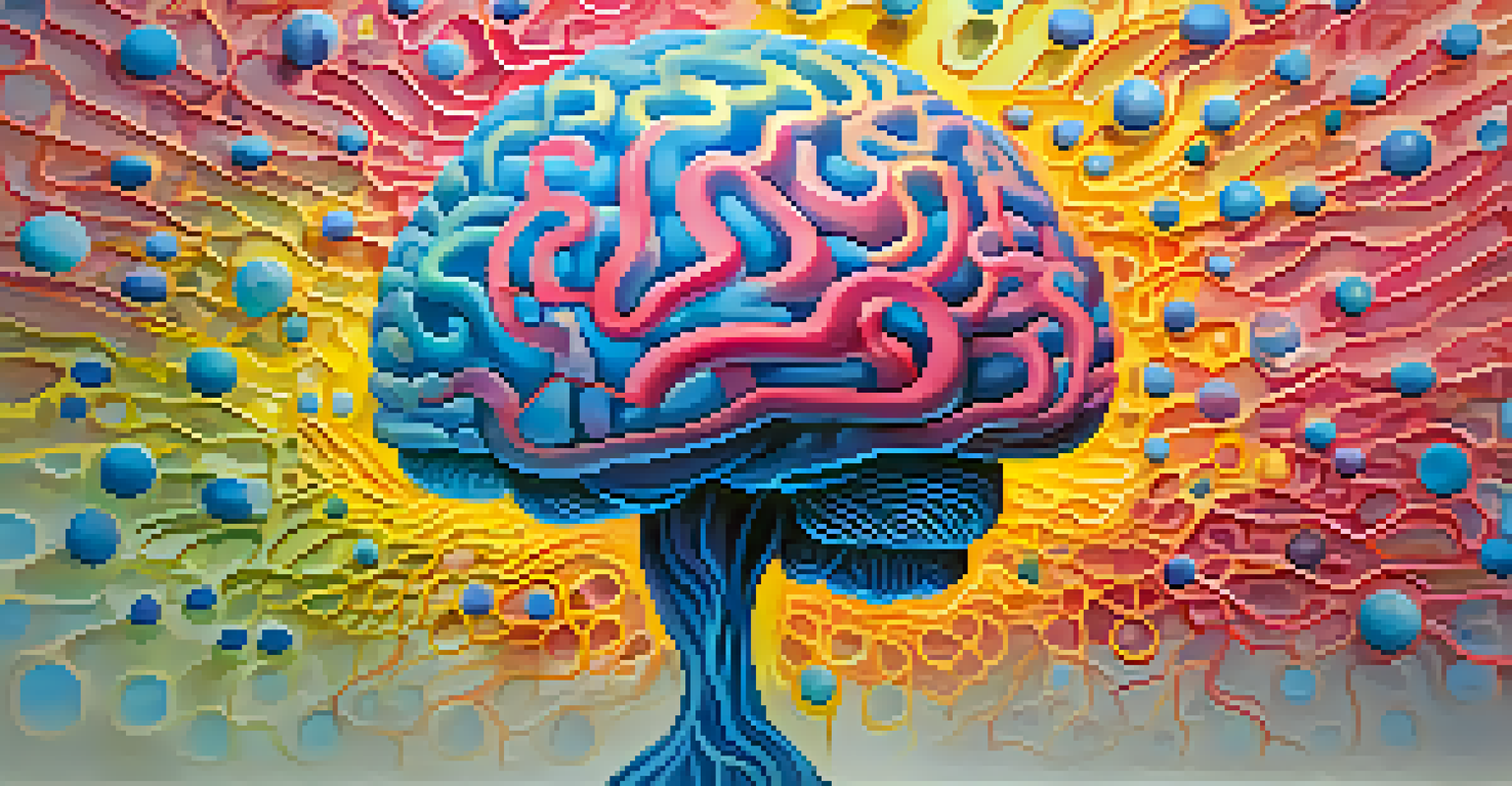Gender's Influence on Hallucinogen-Induced Cognitive Effects

Understanding Hallucinogens and Their Cognitive Effects
Hallucinogens, such as psilocybin and LSD, alter perception, mood, and cognitive processes. These substances can lead to profound experiences that challenge our understanding of reality. The cognitive effects often include changes in thought patterns, emotional responses, and sensory perceptions that can vary significantly from person to person.
The mind is everything. What you think you become.
Research indicates that these experiences can be influenced by various factors, including individual biology and psychological state. As we delve into the influence of gender, it's important to recognize how these differences may affect one's experience and cognitive outcomes. This sets the stage for a deeper exploration of how gender plays a role in these effects.
Understanding these nuances is crucial for both researchers and users alike. It allows for a more tailored approach in therapeutic settings and sheds light on the complex interplay between gender and cognition. Let's explore how gender specifically influences these hallucinogenic experiences.
Biological Differences: Hormones and Brain Chemistry
Biological differences between genders, particularly hormones, can influence how hallucinogens affect cognition. For instance, estrogen has been shown to enhance certain cognitive functions, which may lead to different experiences during hallucinogenic trips. Conversely, testosterone could affect emotional processing, which plays a crucial role in how one interprets their experience.

These hormonal factors suggest that men and women may experience the same substance in distinctly different ways. This biological lens helps us understand the underlying mechanisms that can alter cognitive responses to hallucinogens. By examining these differences, we can begin to appreciate the complexity of gender's impact on cognitive effects.
Gender Influences Hallucinogen Effects
Biological, psychological, and social factors shape how different genders experience the cognitive effects of hallucinogens.
Moreover, these variations in brain chemistry can influence not just the intensity but also the nature of the hallucinogenic experience. This insight opens up discussions about how gender-specific treatments could enhance therapeutic outcomes in psychedelic therapy.
Psychological Factors: Expectations and Experiences
Expectations and past experiences significantly shape how individuals respond to hallucinogens. Research shows that societal norms and personal beliefs about gender can influence these psychological factors. For instance, men might approach a hallucinogenic experience with a sense of bravado, while women may engage more introspectively.
We are not only responsible for what we do, but also for what we do not do.
These differing psychological frameworks can lead to varied cognitive effects during hallucinogenic experiences. A male participant might focus on external stimuli and adventurous insights, while a female participant may have a more emotional and reflective journey. Such differences highlight how psychological aspects intertwine with gender.
Understanding these psychological dimensions not only enriches our knowledge of hallucinogens but also emphasizes the need for gender-sensitive approaches in therapeutic settings. Adapting treatment protocols to individual psychological profiles could lead to more effective outcomes.
Social and Cultural Influences on Hallucinogen Experiences
Social and cultural contexts also play a vital role in shaping how genders experience hallucinogens. Cultural beliefs about masculinity and femininity can dictate the emotional responses and cognitive styles during these experiences. For example, societies that encourage emotional expression in women may lead to deeper introspection during hallucinogenic trips.
Conversely, cultures that promote stoicism in men may inhibit emotional exploration, thus affecting cognitive outcomes. These social constructs create a framework that can either enhance or limit the hallucinogenic experience based on gender. Recognizing these influences is crucial for a comprehensive understanding.
Tailored Treatments Enhance Outcomes
Recognizing gender-specific responses can lead to more effective therapeutic applications of hallucinogens.
As we consider these social factors, it becomes clear that the context of the experience matters as much as the substance itself. Acknowledging the interplay between culture and cognitive effects can lead to more nuanced discussions about hallucinogens and their impact on different genders.
Gender Differences in Therapeutic Applications of Hallucinogens
The therapeutic potential of hallucinogens is vast, but gender differences can influence treatment outcomes. Studies suggest that women may respond better to certain hallucinogenic therapies due to their emotional processing capabilities. This highlights the importance of tailoring treatments to gender-specific needs to maximize effectiveness.
Conversely, men may experience different therapeutic benefits, potentially related to their approach to risk and adventure during hallucinogenic experiences. Such differences underscore the necessity for personalized treatment plans that consider gender as a significant factor. Understanding these distinctions can lead to more successful therapeutic outcomes.
As interest in psychedelic therapy grows, acknowledging these gender-specific responses will be vital. This approach not only promotes inclusivity but also enhances the overall effectiveness of hallucinogenic treatments.
Research Gaps: The Need for Gender-Specific Studies
Despite the growing body of research on hallucinogens, there remains a significant gap in gender-specific studies. Much of the existing literature tends to generalize findings without addressing how gender might influence cognitive effects. This lack of focus makes it challenging to draw definitive conclusions about the role gender plays in hallucinogen-induced cognition.
To truly understand the complexities involved, future research must prioritize gender as a variable. Collecting data that separates responses based on gender can provide clearer insights into how these substances affect different individuals. This step is crucial for developing effective therapeutic applications tailored to each gender's unique needs.
Research Needs Gender-Specific Focus
Future studies should prioritize gender as a variable to understand the unique cognitive effects of hallucinogens.
By addressing these research gaps, we can pave the way for more informed discussions and practices surrounding hallucinogens. This will ultimately contribute to a more comprehensive understanding of their cognitive effects across genders.
Conclusion: Embracing Gender's Influence on Cognition
In conclusion, gender significantly influences the cognitive effects of hallucinogens, shaped by biological, psychological, and social factors. Understanding these dynamics is essential for both researchers and practitioners in the field. By recognizing the unique responses of different genders, we can create more effective therapeutic strategies and enhance individual experiences.
The exploration of gender's role in hallucinogen-induced cognition not only enriches our understanding but also promotes inclusivity in research and treatment. As we continue to investigate these effects, we must advocate for gender-sensitive approaches that prioritize individual needs. This will lead to more meaningful and transformative experiences for all.

Ultimately, embracing the influence of gender on cognition helps us appreciate the intricate tapestry of human experience. It's a journey that invites us to explore not just the substances themselves but also the individuals who partake in these profound adventures.